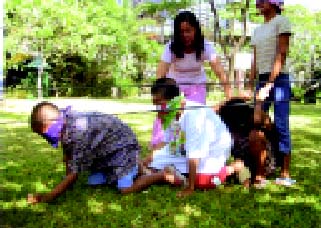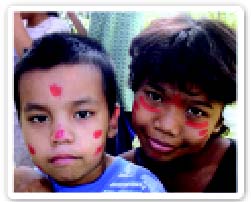Sunflowers Bloom In Summer
By Fr Geraldo Costa CICM

First buds
It was in January 2004 when the plan of holding a `summer camp' for the street children of Manila was conceptualized. Filled with great enthusiasm, I sat down with two Sunflower staffers and Ms Geraldine B. Sanil, then Acting Director of the Guidance Center of Saint Louis University (SLU), Baguio City. We began brainstorming on how to set the wheels in motion, especially if the first camp was to be held that summer. With this small group, we were able to draw a rough outline of activities, and it was from this outline that the camp's title was derived: `A Sunflower is Growing on the Hill _ A Developmental Camp'. The title itself gives an idea what the camp is all about. It is a camp that aims to help abused and street children of Manila to arrive at insights that will lead to greater self-understanding. We want them, like a growing sunflower, to be able to face and follow the bright rays of the sun as they cope with their concerns and become more effective individuals. It is still a summer camp, but what makes it one of a kind is the inspiration to integrate fun activities with therapeutic interventions that will help the children in facing specific problems in their psycho-emotional-social development.
Following the foregoing concept, Sunflower Children's Center spearheaded the first Developmental Camp in April of 2004. It was a three-week camp held on the picturesque hill of Bukal ng Tipan, Taytay, Rizal. The team of facilitators would attest to its awe-inspiring success. From the very beginning, the plan was to make the Developmental Camp a yearly special project in line with the Center's program on advocacy and promotion of children's rights. In the summer of 2005, we were supposed to have a follow-up Developmental Camp serving the children of the previous camp, but it did not push through because the partner institution had other plans for that summer. Nonetheless, preparations for the next camp, in 2006, began as early as the following January. Because of the past experience with the first camp, the planning stage was easier. Armed with overflowing zeal and putting to heart the goals of the project, the Sunflower team (including Sunflower staff, three guidance counselors and one psychometrician from the SLU Guidance Center, one guidance counselor from the SLU Lab Elementary School, and one project employee who helped in the psychological testing) went to Bukal ng Tipan to carry out the plans and once again realize the camp's objectives.
Healing play

Sunflower care
Following the formal end to the camp, for the Sunflower team there was still a week of hard work, since official reports had to be generated incorporating the assessment results and the information and observations gleaned from the individual therapy sessions, group dynamics activities and the day-to-day events of the camp. Inspired by warm memories and not losing sight of the camp's objectives, we were able to finish all the psychological reports in time for the final meeting with the social workers of Kanlungan sa ER-MA Ministry at the CICM Provincial House in Quezon City. During this meeting, four members of the Sunflower team shared the findings and, more importantly, the recommendations with the ER-MA staff. It was a chance to openly discuss the actual interventions that the staff and the institution could provide to help the children in their psycho-social-emotional growth and development.
At present, Sunflower's link with Kanlungan sa ER-Ma Ministry is being continuously nurtured through therapy sessions that I am having with some children from the institution. Twice a month, I go down to Bukal ng Tipan for these sessions. This goes to show that the Developmental Camp is a con-tinuous commit-ment to helping children reach their potential, despite the odds. This, in itself, is a testimony that in-deed, sunflowers (in this case, the children) bloom all year round with proper care and attention given them by concerned caregivers.
The Sunflower team's most memorable experiences:

`Watching a child sitting on the grass and just spending time there . . . it made me realize that when taken in moments, life shows its perfections.' Criselda Marzo, Associate Child Therapist, Sunflower Children's Center, SLU
`Exploring a part of the hill to look for tuko (a type of lizard) in the darkness of the night, the kids brought out my sense of adventure and appreciation for what others might find mundane.' Faridah Kristi Cabbigat, Assistant Director, SLU
`When a child asked me to draw something for him and I knew that I really cannot draw, He started to whine and he moved away from me. When I started to converse with him, he said in Tagalog, "Do I know you?" I was quite embarrassed.' Jeremy Lee dela Cruz, Psychometrician
Most important lessons that the Sunflower team learned from the children:
`Hope . . . that amidst all the uncertainties and frustrations in life, there are far greater, beautiful things in store for everyone. The children also taught me to be a responsible kuya (older brother), how to be a part of the family whose members are bound by love, compassion and understanding, putting aside all differences.' Jeremy Lee dela Cruz
`A hug signifies much of what is inside one's heart. I was really moved when a child gave me a very spontaneous hug then a "thank you" after I cleaned his wounds. . . Therapy might be to give a child a hand and to walk together telling stories _ going up and down the stairs with one of my clients had more meaning for the child than the therapies. In those moments, he would insist on holding my hand. . . Respect is all one needs to start a personal change.' Fr Geraldo Costa CICM
`The children taught me the value of a simple life and how one can be happy even with simple things. Even
though they went through so many difficulties in their young lives, they express such joy and contentment when they are simply playing, and we got to share that joy with the kids during the camp.' Criselda Marzo
`Recognize and thank the Lord for every little blessing that you receive. They may not completely make you happy but they could slowly fill that emptiness in you.' Aileen Jam Mendoza
`The kids taught me that no matter how young (or in my case, how old) you are, no obstacle and problem is too big. We all have strengths that will help us overcome whatever problems we may encounter. Also, they taught me to appreciate my blessings, no matter how simple and small they are.' Rosemond Joyce Ruiz
`That my problems are petty compared to what they have been through. They made me see and appreciate how good my life has been (despite the bumps along the way) and that I should not complain. . . Be generous in showing our appreciation of children _ touch them, make them feel special.' Mary Catherine Peña
`Being with the children reminded me that despite life's imperfections, happiness can be found in the most trivial things. Adults though we are, there are times when we need to be in touch with the child within if we are to keep away feelings of bitterness and cynicism amidst trying circumstances.' Faridah Kristi Cabbigat
`The most important lesson is the key concept of the "NOW" in Gestalt Psychology. . . The past is gone and the future has yet to reveal itself and I find myself useful and grateful for the present.' Triceayn Marie de Guzman n
Even though they went through so many difficulties in their young lives, they express such joy and contentment ...
